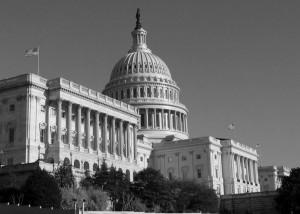Stop the presses – Congress is, yet again, at an impasse about the national budget and it appears as if this time it will consequently shut down the federal government unless lawmakers can come to an agreement by September 30.

There are two main issues at hand. Funding for the government for the 2014 fiscal year (beginning on October 1, 2013) must be decided by Congress by September 30. However, lawmakers have had a difficult time passing the appropriations bills required. Adding to this complication is the fact that the government is about to hit the debt ceiling (the debt ceiling is the legal limit on how much total debt that the government can assume) and the decision to raise or lower it, and thus let the Treasury borrow more or less, is highly contested between Republicans and Democrats. The debt ceiling debacle, though, is far more consequential because it has the potential to affect world markets negatively.
Agreements between Republicans and Democrats seem unlikely at the moment. House Republicans in particular have taken the hard line in the past few days and it looks like their demands will not find an easy compromise among Democrats. According to the Washington Post, House Republicans are taking on a “risky, double-barreled attack on President Obama’s healthcare law” and making it the center of the budget debate. In effect, Republican leaders–particularly Speaker John Boehner–told the media that they would put forward a stopgap government funding bill that would block funding to Obamacare. This is in response to many conservatives who are still demanding that Obamacare be halted. This stopgap bill will be put to a vote on Friday, but it is likely to be met unfavorably with Democrats.
Another initiative by Republicans, this time regarding the debt ceiling, will also target Obamacare directly. In order to lift the debt ceiling, Republicans are demanding that the healthcare law be delayed, as well demanding as other measures such as an overhaul of the tax code and an approval of an energy pipeline.
Needless to say, Democrats are aghast at what Republicans are demanding and the issues seem to point to a battle of wills that will force a government shutdown. In addition to Republican demands making compromise between the two parties highly unlikely, it seems doubtful that Democrats will extend an arm to help as they know that public opinion is strongly against Republicans in this matter. According to a poll taken by CNN, most Americans (51%) would blame the GOP should a government shutdown occur, thus strengthening Democrat popularity and electoral prospects. According to the poll, only a third would blame Democrats.
At the moment, the best possibility to avoid government shutdown by the deadline is if Senator Reid sends back the stopgap bill to the House, stripped of its demands to defund Obamacare. Then the hot potato would be placed again in Speaker Boehner’s hands to either approve the measure with Democratic votes or else to shutdown the government. This, however, does not seem likely.
Recently, congressional budget decisions have taken a pattern most familiar to college students: wait until the last minute before the due date and then patch together a final document. In this instance, it looks like Congress’ current debacle is no different.


